MarketMuse vs. Ahrefs
In the past, I’ve written on how to get the most out of Ahrefs by using MarketMuse. Today we’re conducting a head-to-head comparison of the two platforms.
Be forewarned, these platforms are radically different with distinct objectives. So, in some ways, this isn’t a fair comparison.
Ahrefs was born during a time in Search when backlinks were big, metadata ruled Rank, the SERP was simply a list, and domain authority was King. But times have changed. While Google has been assessing content quality for years, tools from this era struggle to adapt to fundamental changes in the search engine.
MarketMuse was born in the age of content, where Google’s primary new ranking factors are content-specific. Using AI and machine learning, MarketMuse understands a site’s content and can offer intelligent recommendations.
In this post, we look at MarketMuse vs. Ahrefs to see how the two offerings compare in the following areas:
- Content Strategy
- Content Research
- Content Creation
- Content Optimization
- Generative AI
Content Strategy
A major responsibility of a content strategist is determining the best opportunities for creating content with high predictability of success. Plus, they need to decide whether new content should be created or existing pages updated.
MarketMuse
MarketMuse uses state-of-the-art clustering technology to determine high-opportunity pages within topics of interest. Advanced personalized metrics bring greater predictability to content assessment and strategic planning.
MarketMuse knows your site’s content and the topics surrounding those pages. Page and topic inventory keep track of the content, its performance, and various actionable content-specific metrics.
MarketMuse offers several workflows designed specifically for content strategists. When you’ve decided on a page to update or a topic for new content, immediately add it to a plan.
Plans help keep your content strategy organized and on track. A full-fledged note editor lets you add detail to these plans. Order content briefs and topic reports directly from within any plan.
Custom filters can be set to quickly identify the pages and topics in which you are most interested.
Plans help keep your content strategy organized and on track. A full-fledged note editor lets you add detail to these plans. Order content briefs and topic reports directly from within any plan.
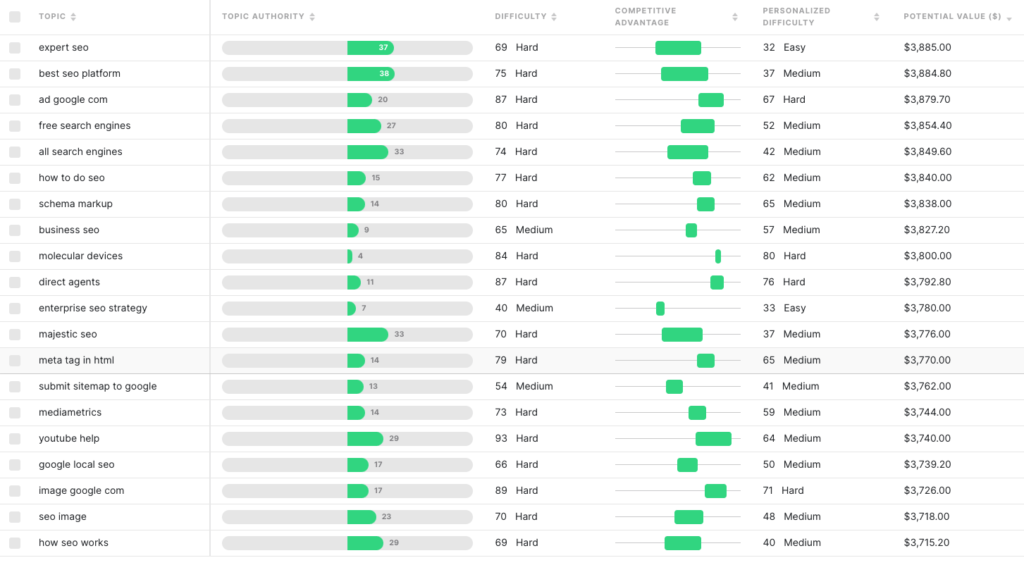
As its name implies, the Personalized Difficulty metric is one that’s personalized to your site and its content. This metric reveals how hard it is for YOU specifically to rank for a given topic.
Ahrefs
Ahrefs is incapable of analyzing content, so it can’t offer any suitable suggestions. The best it can do is provide some generic tools.
Keywords Explorer is a keyword tool that helps Ahref users discover search term ideas, analyze their ranking difficulty, and determine their traffic potential. There are many flaws to this approach, some of which we’ve discussed in previous posts.
Many content marketers rely on keyword difficulty when making content decisions. This is also an unsound approach. The metric, as calculated by Ahrefs, is not personalized and relies solely on links. While that may have worked when links ruled the SERP, those days are long gone.
Site Audit offers a content quality report, but this is a misnomer. The report does reveal duplicate pages and those with low word counts, grouped into buckets.
But that’s it. Don’t expect to find any in-depth analysis of the content and its topical coverage.
Content Explorer sounds like it could fit the bill, but it doesn’t. Enter a search phrase, and it returns a list of relevant pages targeting that term. A bar graph at the top of the list shows pages published and republished over time, giving you a sense of a topic’s popularity.
Unfortunately, you can’t see how these pages are ranking for the particular search phrase. Not that it matters much since there’s no content data to compare, just link metrics, traffic, and social. Although you can drill down to see keywords for which a particular page ranks.
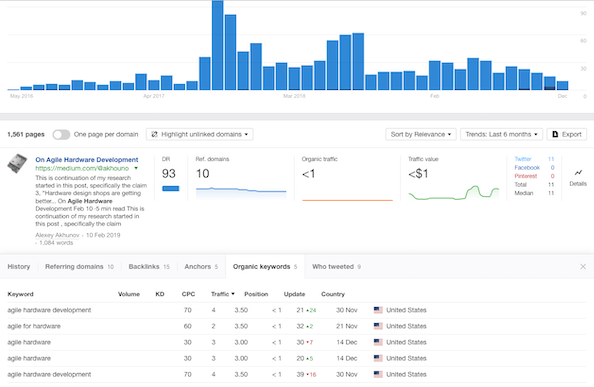
The Content Gap report isn’t necessarily what you think it is. It only identifies gaps in content at a site level. Provide a list of competitors, and it will identify keywords for which those sites rank, and you don’t.
However, it can’t determine which of those phrases, if any, offer the best opportunity for you to target. Plus, since it doesn’t identify gaps in content at the page level, you can’t use it to improve your content.
Rank Tracker, as its name suggests, is for rank tracking of keyword phrases you’ve determined to be essential to your site. You can quickly identify low-hanging fruit, those URLs that are ranking on the second page or lower. Sometimes, but not always, they should be prioritized in your content strategy.
Also, keyword tracking offers zero predictive value. It’s not forward-looking and can’t help you figure out the best path to your destination.
Content Research
Crafting a topically-rich article comprehensively covering a subject requires significant research. We need to know what topics to include if we are to create expert-level content.
Let’s look at a couple of examples to see how both offerings compare.
MarketMuse
Our first subject is “how to build a koi pond in northern climates.” MarketMuse Research goes out to the web and analyzes all the competitive content on the subject. Very quickly, it returns a list of 50 related topics sorted by relevance.
The Suggested Dist. recommends how often a topic should (or shouldn’t) be mentioned. When discussing pond building, the term “water” is used frequently, just like the list shows. It would be odd not to.
However, while a topic like “beneficial bacteria” is important, expert writers don’t mention it frequently, maybe one or two times at most. Use it any more than suggested, and your article could appear over-optimized.
That’s where variants come in handy. Click on a topic to see a list of associated options. Where appropriate, they can be used in place of the topic. This provides variety and interest in your writing while avoiding excessive repetition.

ake a close look at this list. These are the topics that experts address when writing about this subject.
These aren’t lists of phrase matches or same terms. These are the topics semantically related to the subject about which we are going to write.
This is a huge difference.
Here’s another example using the topic “why go solar.”
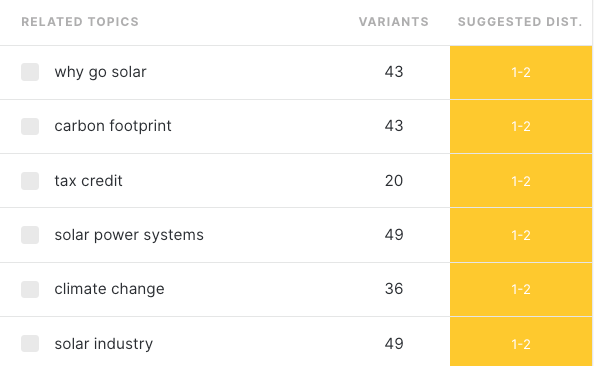
Once more, we get a list of 50 related topics sorted by relevance.
Ahrefs
Ahrefs doesn’t have a dedicated tool or report to help with content research. As we learned in the previous section, Content Explorer has little to do with the actual content itself.
The most likely to help is Keywords Explorer. Let’s see how it fares with our first topic “how to build a koi pond in northern climates.”

Unfortunately, it returned no data whatsoever. Why? Because Ahrefs can only provide data on entries that exist in its keyword database.
Let’s try something easier. How about “why go solar”?

This time it returned a lot of data, but sadly, it’s not very helpful. We need a list of semantically related concepts. Unfortunately, Ahrefs fails to deliver.
Knowing the most important issues to discuss when making a case for going solar will help us create high-quality content. A list of keyword suggestions having the same terms “why,” “go,” and “solar” doesn’t tell us what topics to cover.
The questions also offer little value. They lack the detail and relevance to make them truly useful.
It’s a similar situation with the “Also rank for” list. There’s lots of data to sift through, but little of it is actionable.
Competitive Content Quality Analysis
Use this to determine the weakspots in your competitors, or your own content. MarketMuse Heatmap shows how well your competitors cover a topic, or not, and what you can do to differentiate your content.

You can perform a competitive content quality analysis of the SERP or any website. For larger sites, you can exclude or include various parts — great for getting real granular.

Ahrefs is not able to analyze content quality. Any competitive intelligence gathered will be at a high level and unrelated to content quality.
Content Creation
Creating expert-level content at scale is much more feasible when using content briefs. A content brief empowers writers with reliable guidance and repeatable KPIs. Specifically, it provides them with an article title, subheading titles, topics to cover, plus internal and outbound links to include. Let’s see how Ahrefs and MarketMuse compare in this regard.
MarketMuse
MarketMuse Content Briefs are designed to give writers the direction they need to quickly craft expert-level and SEO-friendly content. Each brief contains:
- Information about the audience and search intent
- Suggested post and subheading titles
- Related topics to cover
- Important questions to answer in the content
- Internal and non-competitive outbound links to include
- Suggested Word Count and Content Score
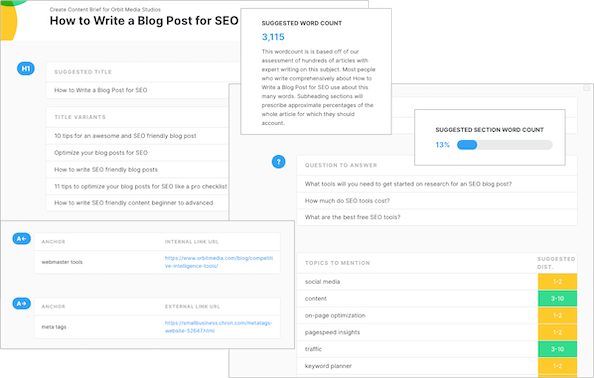
Ahrefs
Ahrefs doesn’t offer content briefs. Those who are up to the task will have to assemble their own. Just know that it takes hours to accomplish this manually,
Plus, you’ll be missing out on much of the necessary data. Ahrefs can’t:
- Recommend an article title
- Offer subheading suggestions
- Suggest topics to cover (keyword research isn’t very useful here)
- Provide internal linking ideas and anchor text
- Propose external linking suggestions and anchor text
You can use the Anchors tool to come up with some external linking ideas. But it’s convoluted, and the anchor text data shows what people use, which isn’t always the best.
Content Optimization
Optimizing your content to be the best content on the web requires some sophisticated competitor analysis. You want to see how comprehensively you’ve covered the subject of your article, including all its related topics, as compared to the competition.
MarketMuse
MarketMuse Pro Optimize is used to optimize a page to optimum topic coverage. It creates a topic model for any given subject and compares the model against a page.
Content can be edited within Optimize. Content score, word count, and term usage update automatically as you type.
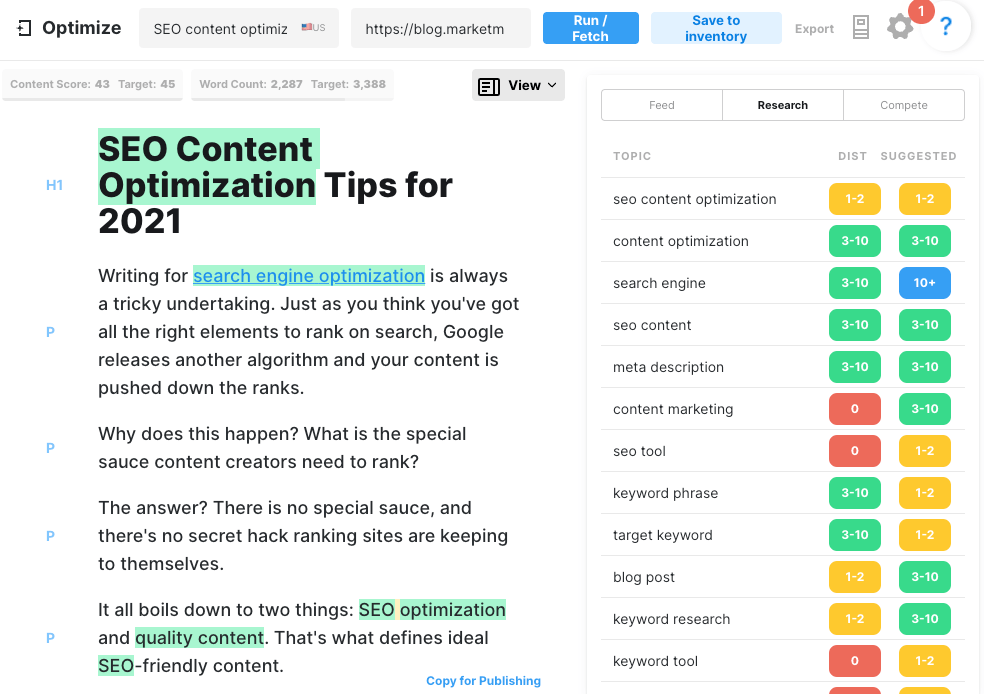
Optimize Content Briefs can be created, as well. These content briefs take into account the existing content on a page and help guide writers in improving it.
Ahrefs
While Ahrefs offers several tools and reports, content optimization isn’t one of them. There is no way to optimize your content beyond title tags, meta descriptions, and H1 tags.
Generative AI
Generative AI is a technology that enables computers to create original content like text, images, and music based on patterns and knowledge it has learned.
MarketMuse
MarketMuse AI gives you the power to craft content that resonates, informs, and captivates your audience like never before. By seamlessly blending the capabilities of large language models and knowledge graphs, MarketMuse AI empowers you to:
- Elevate Your Content: Create engaging and authoritative content that not only captures your audience’s attention but also educates and influences them.
- Enhance SEO: Boost your website’s search engine rankings by producing content that’s not just well-written, but strategically optimized to drive organic traffic.
- Unleash Creativity: Break through creative barriers with a tool that augments your ideas and knowledge, helping you generate fresh and innovative content effortlessly.
- Save Time: Streamline your content creation process with MarketMuse AI’s efficiency, allowing you to focus on what matters most – your core business objectives.
- Stay Informed: Leverage the power of knowledge graphs to ensure your content is backed by the latest, most reliable information, establishing your authority in your industry.
MarketMuse AI keeps humans in the loop enabling them to make informed decisions and maintain control over the content creation process.
MarketMuse AI is your secret weapon for crafting content that stands out, engages your audience, and drives your success to new heights. Experience the future of content creation today!
Ahrefs
Ahrefs has no generative AI capabilities to speak of.
Takeaway
As I stated in the beginning of this post, because these two tools serve different purposes, a direct comparison isn’t necessarily valid.
While Ahrefs has its strengths, content strategy, research, creation, optimization, and natural language generation aren’t on that list. To benefit in those areas, try MarketMuse Pro!
What you should do now
When you’re ready… here are 3 ways we can help you publish better content, faster:
- Book time with MarketMuse Schedule a live demo with one of our strategists to see how MarketMuse can help your team reach their content goals.
- If you’d like to learn how to create better content faster, visit our blog. It’s full of resources to help scale content.
- If you know another marketer who’d enjoy reading this page, share it with them via email, LinkedIn, Twitter, or Facebook.
Stephen leads the content strategy blog for MarketMuse, an AI-powered Content Intelligence and Strategy Platform. You can connect with him on social or his personal blog.